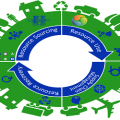在PTE中,无论是Summarise Spoken Text 还是 Re-tell Lecture的考题大都是从真实的讲座或者演讲中截取的中间经常经常夹杂很多不同的环境音.很多同学都反映有时未必是听不懂,而是听不到. 鉴于此,墨尔本悉尼文波雅思PTE专门为大家总结了真实讲座的PTE练习音频,相比新闻音频来说,整体更加接近PTE考试的真题,内容方面,我们也会为大家提供考试中存在的近似题,最近我们会持续更新,敬请期待!
Why is early child development important? The overarching answer is because it is a determining influence on subsequent life chances and health. But why is that? The principle reason is to be found in the fact that in the early years of life, there are a wide range of very key milestones are sensitive periods in brain and biological development. By the time kids reach school age, a huge amount has taken place in terms of their opportunities to develop basic competencies that will code for success in later years, for instance, their visual systems are connecting to the deep structures in the brain that are associated with emotional control. That means the children who have a consistent set of human faces that they see early on in life going through a wide range of emotions are developed the neurobiological ability to decode emotion and to develop a sense of belonging. Those children who are neglected or grow up in environments which are our violent or emotionally barren are developed a completely different style of coping early on in life and a different set of biological connections which do not work so well adaptively later on. Similarly, children early on in life who started off being physically aggressive in situations of social conflict. If by the time they reach school age, they’ve not have the socialising experiences to reduce, eliminate and transform the physically aggressive responses into verbal communication skills, those children that at high risk of going on to labelling and grade failure as time goes on.





